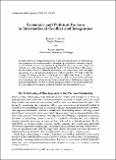| dc.contributor.author | North, Robert C. | |
| dc.contributor.author | Choucri, Nazli | |
| dc.date.accessioned | 2022-04-03T01:40:22Z | |
| dc.date.available | 2022-04-03T01:40:22Z | |
| dc.date.issued | 1983 | |
| dc.identifier.uri | https://doi.org/10.2307/2600556 | |
| dc.identifier.uri | https://hdl.handle.net/1721.1/141518 | |
| dc.description.abstract | In earlier efforts to explain international conflict and integration, the central focus was upon national attributes and decisionmaking as crucial to understanding the actions of states in war- and peacemaking. Recently, however, we have begun to critically reconsider these assumptions. In the face of their inability to fully account for the actions of states in international conflict and cooperation, we have sought out a more basic, disaggregated approach to these questions. We believe that the concept of leverage may serve as an important explanatory factor in theories of interstate relations. Here we offer some preliminary arguments concerning leverage and bargaining among domestic and international actors, fleshing out some of the possible relationships between economic and political behaviors and their effects on the war- and peacemaking activities of states in the international system. | en_US |
| dc.language.iso | en_US | en_US |
| dc.publisher | © International Studies Association | en_US |
| dc.rights | Attribution-NonCommercial-NoDerivs 3.0 United States | * |
| dc.rights.uri | http://creativecommons.org/licenses/by-nc-nd/3.0/us/ | * |
| dc.title | Economic and political factors in international conflict and integration | en_US |
| dc.type | Article | en_US |
| dc.identifier.citation | North, R. C., & Choucri, N. (1983). Economic and political factors in international conflict and integration. International Studies Quarterly, 27(4), 443–461. | en_US |
| dc.eprint.version | Final published version. | English |
